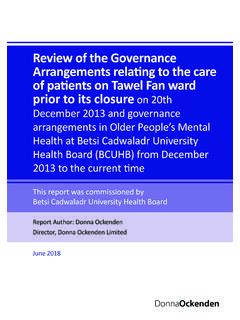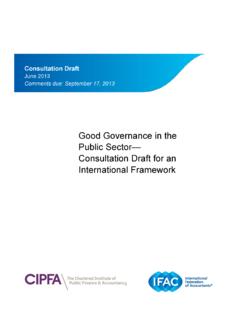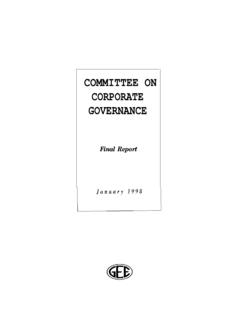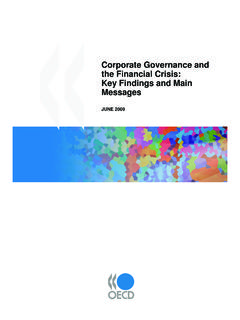Transcription of Positive Corporate Governance and its Implications for ...
1 ARTICLES Positive Corporate Governance and its Implications for Executive Compensation By James McConvill* Abstract: As a result of a series of high-profile Corporate collapses worldwide, along with regular reporting of shareholder money being spent on Corporate jets, executive golf days and increasingly excessive executive compensation arrangements, the common perception is that the executives of our largest corporations are driven by self-interest with little regard for what is best for the corporation. Due to this negative perception, there has been an exponential increase in the amount of laws, rules and guidelines setting in place a heightened standard of Corporate Governance best practice.
2 Without such regulation, it is believed, another collapse or scandal is inevitable. In this article, I dispute this reasoning. In my view if we embrace Positive Corporate Governance , in which the Positive strengths and virtues of company executives are emphasised, we can move towards an environment in which heavy regulation is replaced by Positive Corporate norms inside the corporation. I then apply my approach of Positive Corporate Governance to address one of the most significant issues confronting Corporate regulation at present- how to deal with the rapid increase in executive compensation in our largest corporations.
3 I suggest that the dominant methodology of pay for performance is ultimately flawed. A. Introduction There is a growing perception that company directors and executives are self-interested actors, using their position in the company to pursue their own ends rather than being focused on pursuing what is best for the company and its stakeholders. This perception is aided by recent news of the record 25-year jail sentence handed down to former boss Bernard Ebbers for his part in * Principal, The Corporate Research Group, Australia; Lecturer, Deakin Law School, Melbourne.
4 Email: 1778 [Vol. 06 No. 12 GERMAN LAW JOURNAL the fraud that caused the $11 billion collapse of that company,1 and reports of overly-exuberant compensation arrangements at US insurance company Fannie Mae, in which large rewards were provided to company executives even if the company failed or their own performance was not up to Indeed, according to Harvard professor Robert C. Clark in a recently-released paper, the media frenzy following the collapse of Enron and a host of other Corporate scandals, resulted in a social facilitation (a term derived from social psychology)]
5 Of the idea that the bursting of the Corporate bubble was due to bad Corporate behaviour, rather than normal economic The growing distrust of, and scepticism towards, company executives and directors across the developed world has resulted in an panoply of new Corporate Governance requirements enshrined in legislation (in particular, the Sarbanes-Oxley Act in the US) or through other regulatory mechanisms (eg, the NYSE rules and the requirements of Corporate Governance ratings agencies);4 the assumption 1 See James McConvill and Mirko Bagaric, Give The Corporate Crooks A Break, LAWYERS WEEKLY (Australia), 19 August 2005.
6 2 See Lucian Bebchuk and Jesse Fried, Executive Compensation at Fannie Mae: A Case Study of Perverse Incentives, Non-Performance Pay, and Camouflage, John M. Olin Center for Law, Economics & Business Working Paper, Harvard Law School, January 2005. 3 See Robert C. Clark, Corporate Governance Changes in the Wake of the Sarbanes-Oxley Act: A Morality Tale to Policymakers Too, John M. Olin Center for Law, Economics & Business Working Paper, Harvard Law School, September 2005 (forthcoming in 2006 in THE Corporate Governance LAW REVIEW).
7 Clark believes that because of this, major legal reform to stop Corporate fraud was [seen as a] needed response (at 2). See also Larry Ribstein, Sarbanes Oxley After Three Years, Illinois Law and Economics Working Paper Series, Working Paper No. LE05-016, June 2005. 4 The most significant changes made by the Public Company Accounting Reform and Investor Protection Act 2002 ( Sarbanes-Oxley Act ) included: 1. prohibiting registered public accounting firms from performing specified non-audit services contemporaneously with a mandatory audit, with firms only allowed to perform such services if they are approved by the client s audit committee, or the fees for non-audit services amount to no more than 5% of total revenues paid to the auditor by the company.
8 2. requiring that the lead audit partner and the review partner for each audit client be replaced every five years. 3. prohibiting a registered public accounting firm from performing statutorily mandated audit services for a company if the audit client s senior management officials had been employed by the audit firm and participated in the client s audit during the one-year period proceeding the audit initiation date. 4. requiring that a company s audit committee have the responsibility for the appointment, compensation and oversight of a registered public accounting firm, that is required to 2005] 1779 Positive Corporate Governance & Executive Compensation perform the audit.
9 Members of the audit committee must be members of the board of directors of the company, and be independent. 5. the establishment of a Public Company Accounting Oversight Board with the following mandate: a. overseeing the audit of public companies that are subject to the securities laws; b. establishing audit reporting standards and rules; and c. investigating, inspecting, and enforcing compliance relating to registered public accounting firms, associated persons, and the obligations and liabilities of accountants.
10 As to the New York Stock Exchange Rules on Corporate Governance , which were approved by the SEC in November 2003 (with amendments made in 2004), see section 303A of the NYSE Listed Company Manual. The main Corporate Governance rules introduced by the NYSE were that: Listed companies must have a majority of independent directors and 'independence' is defined in detail. To empower non-management directors to serve as a more effective check on management, the non-management directors of each listed company must meet at regularly scheduled executive sessions without management.







